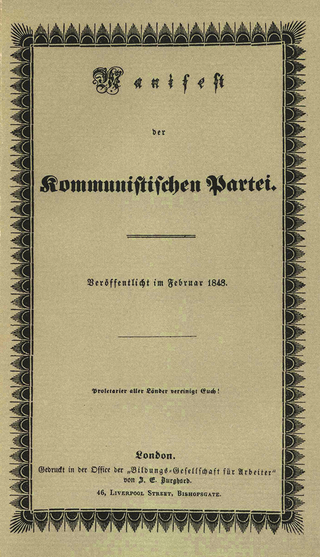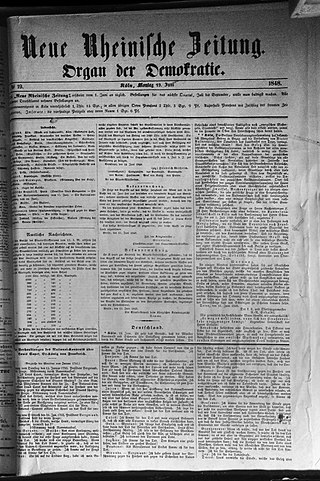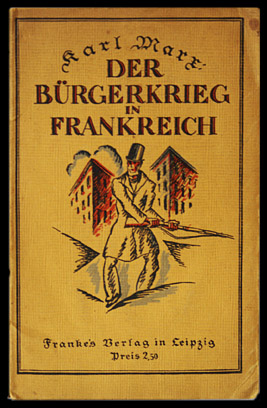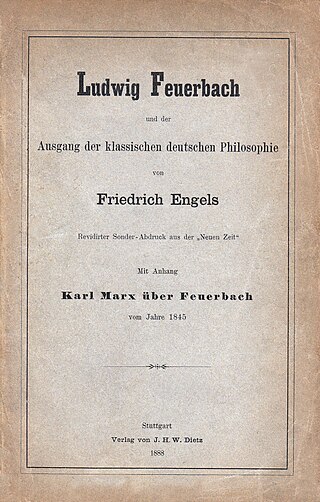Related Research Articles

Karl Marx was a German-born philosopher, political theorist, economist, historian, sociologist, journalist, and revolutionary socialist. His best-known works are the 1848 pamphlet The Communist Manifesto and his three-volume Das Kapital (1867–1894); the latter employs his critical approach of historical materialism in an analysis of capitalism, in the culmination of his intellectual endeavours. Marx's ideas and their subsequent development, collectively known as Marxism, have had enormous influence on modern intellectual, economic and political history.

The Communist Manifesto, originally the Manifesto of the Communist Party, is a political pamphlet written by Karl Marx and Friedrich Engels, commissioned by the Communist League and originally published in London in 1848. The text is the first and most systematic attempt by Marx and Engels to codify for wide consumption the historical materialist idea that "the history of all hitherto existing society is the history of class struggles", in which social classes are defined by the relationship of people to the means of production. Published amid the Revolutions of 1848 in Europe, the Manifesto remains one of the world's most influential political documents.

Friedrich Engels was a German philosopher, political theorist, historian, journalist, and revolutionary socialist. He was also a businessman and Karl Marx's closest friend and collaborator, serving as a leading authority on Marxism.

Polemic is contentious rhetoric intended to support a specific position by forthright claims and to undermine the opposing position. The practice of such argumentation is called polemics, which are seen in arguments on controversial topics. A person who writes polemics, or speaks polemically, is called a polemicist. The word derives from Ancient Greek πολεμικός 'warlike, hostile', from πόλεμος 'war'.

The Neue Rheinische Zeitung: Organ der Demokratie was a German daily newspaper, published by Karl Marx in Cologne between 1 June 1848 and 19 May 1849. It is recognised by historians as one of the most important dailies of the Revolutions of 1848 in Germany. The paper was regarded by its editors and readers as the successor of an earlier Cologne newspaper, the Rheinische Zeitung, also edited for a time by Karl Marx, which had been suppressed by state censorship over five years earlier.

Socialism: Utopian and Scientific is a short book first published in 1880 by German-born socialist Friedrich Engels. The work was primarily extracted from a longer polemic work published in 1878, Anti-Dühring. It first appeared in the French language.

"The Civil War in France" is a pamphlet written by Karl Marx, as an official statement of the General Council of the International on the character and significance of the struggle of the Communards in the Paris Commune.
Bourgeois socialism or conservative socialism was a term used by Karl Marx and Friedrich Engels in various pieces, including in The Communist Manifesto. Conservative socialism was used as a rebuke by Marx for certain strains of socialism but has also been used by proponents of such a system. Bourgeois socialists are described as those that advocate for preserving the existing society while only attempting to eliminate perceived evils of the system. Conservative socialism and right-wing socialism are also used as a descriptor, and in some cases as a pejorative, by free-market conservative and right-libertarian movements and politicians to describe more economically interventionist strands of conservatism, such as paternalistic conservatism.
The relationship between Pope Benedict XV and Russia occurred in a very special context, that of the 1917 Russian Revolution. The seizure of power by the Bolshevik revolutionaries unleashed an unprecedented wave of persecutions against the Roman Catholic Church and the Russian Orthodox Church, who were forced to cooperate during a time of distress.
Classical Marxism is the body of economic, philosophical, and sociological theories expounded by Karl Marx and Friedrich Engels in their works, as contrasted with orthodox Marxism, Marxism–Leninism, and autonomist Marxism which emerged after their deaths. The core concepts of classical Marxism include alienation, base and superstructure, class consciousness, class struggle, exploitation, historical materialism, ideology, revolution; and the forces, means, modes, and relations of production. Marx's political praxis, including his attempt to organize a professional revolutionary body in the First International, often served as an area of debate for subsequent theorists.

Marxist literary criticism is a theory of literary criticism based on the historical materialism developed by philosopher and economist Karl Marx. Marxist critics argue that even art and literature themselves form social institutions and have specific ideological functions, based on the background and ideology of their authors. The English literary critic and cultural theorist Terry Eagleton defines Marxist criticism this way: "Marxist criticism is not merely a 'sociology of literature', concerned with how novels get published and whether they mention the working class. Its aims to explain the literary work more fully; and this means a sensitive attention to its forms, styles and, meanings. But it also means grasping those forms styles and meanings as the product of a particular history." In Marxist criticism, class struggle and relations of production are the central instruments in analysis.
Revolutionary socialism is a political philosophy, doctrine, and tradition within socialism that stresses the idea that a social revolution is necessary to bring about structural changes in society. More specifically, it is the view that revolution is a necessary precondition for transitioning from a capitalist to a socialist mode of production. Revolution is not necessarily defined as a violent insurrection; it is defined as a seizure of political power by mass movements of the working class so that the state is directly controlled or abolished by the working class as opposed to the capitalist class and its interests.
Socialism in one country is a theory developed by Joseph Stalin to strengthen socialism within the country rather than socialism globally. Given the defeats of the 1917–1923 European communist revolutions, Stalin encouraged the theory of the possibility of constructing socialism in the Soviet Union. The theory was eventually adopted as Soviet state policy.

The political slogan "Workers of the world, unite!" is one of the rallying cries from The Communist Manifesto (1848) by Karl Marx and Friedrich Engels.

The Communist League was an international political party established on 1 June 1847 in London, England. The organisation was formed through the merger of the League of the Just, headed by Karl Schapper, and the Communist Correspondence Committee of Brussels, Belgium, in which Karl Marx and Friedrich Engels were the dominant personalities. The Communist League is regarded as the first Marxist political party and it was on behalf of this group that Marx and Engels wrote the Communist Manifesto late in 1847. The Communist League was formally disbanded in November 1852, following the Cologne Communist Trial.

The Grundrisse der Kritik der Politischen Ökonomie is an unfinished manuscript by the German philosopher Karl Marx. The series of seven notebooks was rough-drafted by Marx, chiefly for purposes of self-clarification, during the winter of 1857–8. Left aside by Marx in 1858, it remained unpublished until 1939.

The "Theses on Feuerbach" are eleven short philosophical notes written by Karl Marx as a basic outline for the first chapter of the book The German Ideology in 1845. Like the book for which they were written, the theses were never published in Marx's lifetime, seeing print for the first time in 1888 as an appendix to a pamphlet by his co-thinker Friedrich Engels. The document is best remembered for its epigrammatic 11th and final thesis, "Philosophers have only interpreted the world, in various ways; the point, however, is to change it", which is engraved on Marx's tomb.
Karl Friedrich Schapper was a German socialist and labour leader. He was one of the pioneers of the labour movement in Germany and an early associate of Wilhelm Weitling and Karl Marx.
Permanent revolution is the strategy of a revolutionary class pursuing its own interests independently and without compromise or alliance with opposing sections of society. As a term within Marxist theory, it was first coined by Karl Marx and Friedrich Engels as early as 1850, but since then different theorists - most notably Leon Trotsky - have used the phrase to refer to different concepts.
Historical materialism is Karl Marx's theory of history. Marx located historical change in the rise of class societies and the way humans labor together to make their livelihoods.